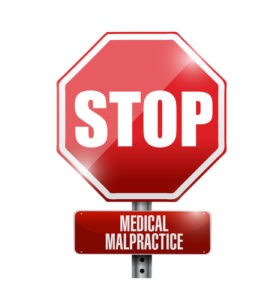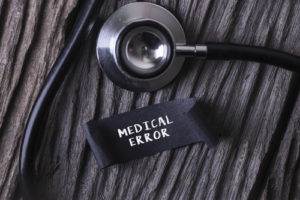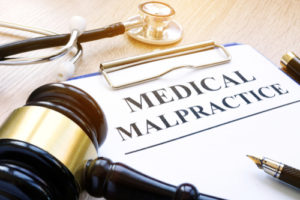Category: Legal Information

There is a statute of limitations on medical malpractice cases in Florida. According to F.S. §95.11(4)(b), victims must file a lawsuit within two years from the time of the malpractice incident—or two years from the time the incident was discovered. To speak with a medical malpractice lawyer in Florida about the statute of limitations in your
Read More
There are limitations on attorney fees in Florida medical malpractice cases. State law limits the contingent fees attorneys may charge in medical malpractice cases. At Medical Malpractice Help, we charge on a contingency basis within the state’s guidelines. We also offer free case evaluations, so you can learn more about your legal options before you
Read More
Despite the best efforts of doctors and other healthcare professionals, medical mistakes happen every day. What separates a mistake from medical malpractice is often not the areas in which they occur, but the degree to which the mistakes were avoidable and their impact on the patient. Areas in which the potential exists for medical mistakes
Read More
Despite the best efforts of doctors and other healthcare professionals, medical mistakes happen every day. What separates a mistake from medical malpractice is often not the areas in which they occur, but the degree to which the mistakes were avoidable and their impact on the patient. Areas in which the potential exists for medical mistakes
Read More
If you are facing mounting medical bills because of an injury or illness caused by medical malpractice, your best option is to file a lawsuit against the responsible party or parties. You have a good chance of winning a judgment or settlement that includes money for your current and future medical bills, plus compensation for
Read More
A case is medical malpractice, if it can establish four things: the defendant’s duty of care, the defendant’s standard of care violation, causation, and damages. Duty of Care The first element of a successful medical malpractice case is proving that the defendant owed you a duty of care. In other words, you must show that
Read More
Minor medical errors are mistakes healthcare providers make that do not result in significant harm to their patients or anyone else. When a healthcare provider commits an act of clear negligence that causes harm, however, they may be liable for medical malpractice. If you suffered harm because of an error made by a doctor or
Read More
Malpractice cases are notoriously complex and difficult to litigate, so it is essential you go about it the right way. In most medical malpractice situations, there are a few things you should consider doing before calling a medical malpractice lawyer and filing suit: Learn about the statute of limitations in your state Talk to the
Read More
Proving your doctor violated a “standard of care” is a major hurdle to clear toward winning your medical malpractice case, but it is not all that is required to be awarded damages. You first must prove that your doctor owed you a standard of care to begin with, and you must demonstrate that by violating
Read More
You may have a case if your condition got worse due to your doctor failing to refer you to a specialist. All doctors, health care providers, and medical facilities have a duty of care to act in their patient’s best interest. Often, it is in a patient’s best interest to receive treatment from someone who
Read More
If your doctor misdiagnosed AIDS or HIV — either by diagnosing you as negative when you had the disease or as positive when you did not — you or your spouse may have grounds for a medical malpractice lawsuit and a lucrative award. Plaintiffs have won substantial malpractice awards from doctors who misdiagnosed AIDS or
Read More
You can sue for future medical expenses in a medical malpractice lawsuit. But to win these damages, you must prove they are legitimate, just as you do with any compensation you seek in a civil tort lawsuit. In other words, you must convince a judge and jury that you are more likely than not to
Read More
For a doctor or health care provider to commit malpractice, four conditions must be present. The party must owe a standard of care to the patient and he or she must violate that standard of care. The patient must suffer harm as a direct result of the party’s failure and his or her injuries must
Read More
The three categories of locked-in syndrome are complete, classic, and incomplete. The severity of the condition and the level of movement restriction determine the category of locked-in syndrome, with complete form being the most severe, incomplete form the least, and classic form in the middle. No matter which category of locked-in syndrome a person has,
Read More
Doctors typically diagnose brain stem strokes via imaging tests, the most common being magnetic resonance imaging (MRI), computed tomography (CT), and angiogram. Because a brain stem stroke is a legitimate medical emergency, the sooner one of these tests gets performed and a diagnosis rendered, the better the patient’s chances of long-term recovery. If a brain
Read More
Most medical malpractice cases settle out of court. In many situations, reaching an out-of-court settlement benefits both the defendant and the plaintiff. The plaintiff gets paid faster without having to wait for their case to travel through the legal system. The defendant might also benefit from settling. By settling, a doctor or healthcare provider avoids
Read More
Medical expert witness testimony is required for all malpractice cases in Florida. Only someone who meets the requirements established in F.S. §766.202(6) legally qualifies as a medical expert witness in Florida. The statute requires that a medical expert witness must: Regularly practice in their field; Hold a professional degree from a university or college; and
Read More
Informed consent is the type of consent that is most commonly an issue in a medical malpractice case. Before performing a medical procedure, a doctor or healthcare provider has a duty to warn the patient of the known risks involved. They must also make the patient aware of alternative treatment options if they exist. This
Read More
The legal standards to hold your doctor liable in a medical malpractice lawsuit are fourfold. One, your doctor must have had a duty of care to you (or your injured loved one). Two, your doctor must have failed to uphold that duty of care. Three, you or your loved one must have suffered injuries because
Read More
If you, your loved one, or your child suffered injuries during a medical procedure in Florida, you might be eligible for compensation—even if no malpractice occurred. Florida’s patient compensation funds provide money for specific injuries. If you are eligible for one of these funds, you could get paid without having to file for medical malpractice.
Read More
When you hear that someone has filed a lawsuit for medical malpractice, you might assume that the defendant is a doctor. However, you can file a lawsuit against someone other than a doctor if they harmed you by committing medical negligence. Your state’s laws will determine which medical professionals and healthcare facilities can face lawsuits
Read More
If you believe you might have been the victim of medical negligence, you could have the basis for a medical malpractice claim. A lawyer can investigate your medical malpractice case, following the rules of evidence and civil procedure to obtain documents and records. If an attorney can get convincing proof, you could recover damages. At
Read More
You should not say anything to the doctor or the insurance company that can be used against you. The defendant in your case could take things you say and twist them into something you did not really mean. The lawyers at Medical Malpractice Help can help you understand the limits to what you can say
Read More
Florida is a pure comparative negligence state. Under Florida law, the claimant and defendant can share fault in a medical malpractice case. If the claimant contributed to their own injuries, their compensation from the defendant is reduced in proportion to their blame. Even if the fault is shared, a claimant will receive some compensation for
Read More
State law establishes the pre-filing requirements in a Florida medical malpractice case. If you attempt to file a lawsuit without completing these requirements, you will not be able to take legal action or recover damages. A medical malpractice lawyer in Florida can help you meet these pre-filing requirements and comply with other state regulations. Call Medical
Read MoreLegal Information
